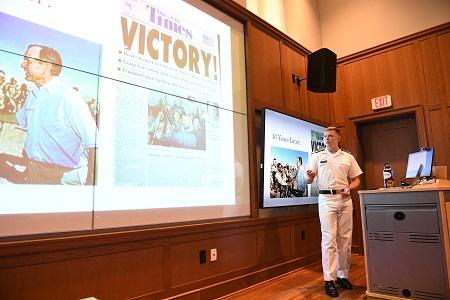Cadet Researches The Cultural Renaissance of the Post-Vietnam Army


LEXINGTON, Va., April 5, 2022 — Has the Army improved since the Vietnam war? Has it acknowledged and corrected the mistakes made? Michael M. Hoffmann ’22, who commands the 1st Battalion within the Corps of Cadets at Virginia Military Institute, believes it has and defended his thesis in his presentation titled, “Kicking the Army’s Vietnam Syndrome: The Cultural Renaissance of the Post-Vietnam Army” during Honors Week held March 21-31.
Hoffmann, who is a dual major in history and international studies, is the son of Mario (who recently retired from the Army after serving 20 years) and Tina (who served four years in the Army before becoming a nurse) Hoffmann of Yorktown, Virginia. He is a member of the Army ROTC and ranked 5th in the nation, earning the position above thousands of his peers, based on grade point average, physical fitness, leadership evaluations and technical competency. His younger brother, Daniel is a sophomore at West Point in New York.
In his presentation, Hoffmann reported that after the Vietnam war, the Army was inflicted by malaise, disillusionment, drug use, and terrible morale. Yet just sixteen years later in 1991, there was a decisive military victory in Iraq.
The extreme and significant change, Hoffmann argued, was due to the new culture in the Army, brought on by organizational honesty and leadership with new insight. He describes culture as the linchpin, a vital component that holds all other aspects of the Army together.
Hoffmann credits four conscientious commanders for the turnaround of the Army culture: Gen. William Westmoreland, who saw the importance to invest in people; Gen. John Cushman, who believed in teaching people how to think, rather than what to think, and believed in the strength of providing role models; Gen. Maxwell Thurman, who made organizational improvements and is credited with the slogan, “Be All You Can Be”; and Gen. Paul Gorman, who instituted the National Training Centers, which provide realistic and effective combat training exercises.
Upon graduating in May, Hoffmann will be commissioning into the Army infantry and will attend Infantry Basic Officer Leader Course (IBOLC) in June at Ft. Benning, Georgia.
Marianne Hause
Communications & Marketing
VIRGINIA MILITARY INSTITUTE
.svg)
.png)